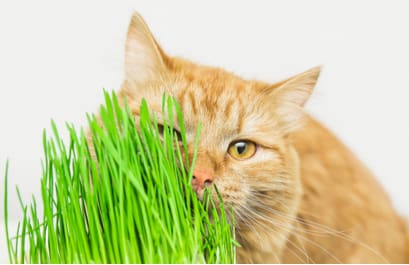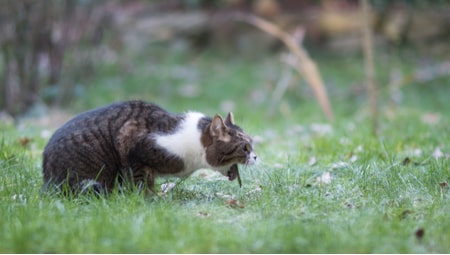
Indoor cats should eat grass as it:
● Provides a healthy dose of the essential nutrient folic acid
● Is a natural part of their behavior
● Can improve digestion
● Helps deal with anxiety
● Can relieve a bad stomach ache
If eating obsessively or always vomiting after, take it to the vet.
The Reasons Why Indoor Cats Should Eat Grass
If your indoor cat likes to eat grass now and then this is completely normal behavior and has a number of health advantages for your cat.
1. Grass is a Great Source of Folic Acid
The sticky white fluid inside the blades of grass is rich in folic acid. This is an essential nutrient that cats rarely get through their normal diet.
As a kitten, your cat will have got a healthy dose of folic acid from its mother’s milk. Folic acid is essential to a cat’s health because it helps to produce oxygen in it’s bloodstream.
If a deficiency of folic acid occurs with a cat, their growth is stunted ,and it may develop anemia. Some researchers think that cats have a natural instinct to eat grass in order to get their essential dose of folic acid.
If you care for an indoor cat that has no access to grass, you may want to consider growing or buying some cat grass.
A small patch of cat grass in your home will allow your cat to get their essential folic acid, and they will enjoy sitting and rolling on the grass too. Ian – the comma is for American English
Another alternative would be to buy folic acid supplements for you to combine with your cat’s food. Speak to your local vet before purchasing any supplements for your cat to make sure it is necessary.
2. It’s Natural Behaviour

Recent research suggests that cats eat grass because it is an ancestral habit that has stuck with the species for thousands of years.
Scientists believe that cats living in the wild would normally eat grass as a way to remove any intestinal parasites they have picked up.
Cat’s lack the enzymes needed to digest grass matter, so a cat would normally vomit, allowing the parasite to exit the cat’s body.
Now, even though intestinal parasites are extremely rare for a house cat to pick up, your cat continues this evolutionary habit anyway out of its natural animal instincts.
This habit of using non-digestible plants to help remove parasites is a common behavior exhibited in many other animals from the cat family, including lions, tigers, cheetahs, jaguars, and pumas. The behavior has also been observed in many primate species.
Humans have also been known throughout history, and even still today, to purposely eat plants that help them to purge in order to remove various parasites or “toxins.”
3. It Can Improve Digestion

You may have noticed that your cat doesn’t mind gobbling up all sorts of items from the floor of your home.
Cats, especially when young, like to eat everything so they can learn what is edible and what is not edible.
This means your cat often eats bits of things that they can not pass through their digestion system. Eating grass can help your cat to pass through any material that they cannot break down, such as fur, bones, and feathers.
Eating grass can help to move
the items through their system so they can excrete or help them to regurgitate the unwanted items
back up. The most common occurrence of this is when a car gets a furball. Ian – due to the amount said in the paragraph before, I
felt this could be said more succinctly
The grass acts as a natural laxative for your cat. The fiber from the grass can help to add bulk to their diet, which is important for a carnivorous animal whose diet is mostly made up of meat. It’s thought that different types of grasses can help with different functions.
Wide leaf plants can help your cat to improve their digestion and pass stools much more easily. Narrow leafed plants are great for helping your cat to vomit. It’s worth noting that this is not the case with all cats. Some cats may never eat grass to help with their digestion or vomiting.
4. Help with Anxiety

Just like humans, all animals experience varying levels of anxiety. It is a normal emotion that has helped animals of all kinds survive for millennia.
When your indoor cat eats grass, it may be helping to reduce their level of anxiety.
However, too much anxiety is not good for us or our cats, so it’s important to observe your cat’s behavior.
Cats that are constantly eating grass or your house plants may be showing signs of anxiety. Cats suffer from anxiety for a number of reasons including:
- Pain or illness
- Exposure to something toxic
- An infectious disease
- Traumatic experience
- Lack of proper socialization
- History of abuse or neglect
All of these issues may lead to your cat eating grass excessively out of anxiety. This is known as ‘comfort eating’ and is a common issue with humans and other animals too. The following behaviors would signal that your cat may be suffering from anxiety.
- Frequent trembling or shaking
- Hiding or becoming recluse
- Less energy and lethargic
- Running away or trying to escape
- Angry, destructive or aggressive behavior
- Frequent diarrhea
- Refusing to use their litter box
- Self-harm in the form of lesions or sores from over-grooming
If you think your cat is suffering from any of the above, it may be dealing with anxiety. You should take your cat to the vet for a checkup and get professional advice on how to care for your anxious cat.
5. Relief of Bad Stomach and Vomiting

Just like humans, cats often get bad stomach aches that need to be dealt with. It’s believed that cats will eat grass when they experience a stomach ache so that they can regurgitate any unwanted items that may be causing the ache.
Your cat spends a lot of the time in your house eating various foreign objects. This could be food that’s been left on the floor, bits of paper, fluff, dust bunnies, spiders, and all sorts of flying/crawling insects. It’s no surprise then that our feline friends get the odd stomach ache.
When a cat experiences a stomach ache, you may find them nibbling on grass in a bid to help them vomit or pass the items through their digestion to excrete later. Ian – I did this to make it active instead of passive voice, as we find that does better with readers.
This behavior is very similar to a human forcing themselves to vomit when suffering from a stomach bug or food poisoning.
It’s important that you observe your cat’s behavior. If your cat is regularly eating grass and vomiting each time, there may be a more serious issue with its health.
In this case, seek the advice of a professional vet so they can give your cat a check-up and determine the cause of the problem.
Eating Grass Excessively or Vomiting Every Time After Eating It Is a Bad Sign
As discussed, your cat’s grass-eating habit is most likely very normal and even beneficial to your cat’s health and wellbeing. However, there are instances when it can become a sign of bigger issues.
If you notice that your cat is eating grass or house plants excessively, then this may be a bad sign. If the excessive grass eating is also followed by vomiting, then this is also a clear sign that something may be troubling your feline friend.
Your cat’s excessive grass-eating could be due to issues with anxiety, stomach problems, or an infectious disease. Vomiting after each grass-eating session could be the result of stomach infection or poisoning.
If you notice your cat excessively eating grass, you should seek the help of your local vet for a quick health check-up and advice.
Growing Grass for Your Cat Is a Good Way to Promote Healthy Eating

If you have an indoor cat that has no access to grass, you should consider introducing one or both of them into your home.
Growing cat grass is really simple. Sites like Amazon or your local pet shops sell cat grass kits that will supply you with everything you need to grow a patch of cat grass.
All you need is a good-sized plant pot, seeds, healthy organic soil, and water. Seedlings usually emerge within two weeks, and then direct sunlight with adequate water will help the grass grow tall. Your cat will love the introduction of a small grass patch that it can munch on.
Cat grass makes for a happy cat.
Best to Only Introduce Grass to Cats That Are 12 Months Old or More

Cats of any age can enjoy the benefits of munching on cat grass. However, it’s advised that you start to offer cat grass at an older age such as when they are adults.
Grass is fine for kittens to eat, but not at a very young age, kittens love to eat anything and everything in excess. This means that your kitten could form an unhealthy relationship with grass, eating too much, and carrying that habit into older age.
It’s best to introduce cat grass into your home when your cat has matured;,
this is usually after 12 months of age.
Kittens with access to lots of grass may eat it excessively, causing them to suffer from health issues.
Be Careful Not to Have Plants That Are Toxic to Cats If They Eat Them

It’s extremely important that you don’t have plants that are toxic your cat. The following plants are all harmful to your cat:
- Amaryllis (Amaryllis spp.)
- Autumn Crocus (Colchicum autumnale)
- Azaleas and Rhododendrons (Rhododendron spp.)
- Castor Bean (Ricinus communis)
- Chrysanthemum, Daisy, Mum (Chrysanthemum spp.)
- Cyclamen (Cyclamen spp.)
- Daffodils, Narcissus (Narcissus spp.)
- Dieffenbachia (Dieffenbachia spp.)
- English Ivy (Hedera helix)
- Hyacinth (Hyacintus Orientalis)
- Kalanchoe (Kalanchoe spp.)
- Lily (Lilium sp.)
- Lily of the Valley (Convallaria majalis)
- Marijuana (Cannabis sativa)
- Oleander (Nerium oleander)
- Peace Lily (Spathiphyllum sp.)
- Pothos, Devil’s Ivy (Epipremnum aureum)
- Sago Palm (Cycas revoluta)
- Spanish Thyme (Coleus ampoinicus)
- Tulip (Tulipa spp.)
- Yew (Taxus spp.)
When buying any new house plant, you should always research the name of the plant first to make sure it is safe for your furry friend.
Toxic plants can cause serious health issues for your cat, such as stomach aches, poisoning, loss of energy, vomiting, diarrhea, and in some cases, even death.

Sources
- http://www.animalplanet.com/pets/why-do-cats-eat-grass/
- https://www.burpee.com/gardenadvicecenter/encyclopedia/herbs/learn-about-cat-grass/encyclopedia__CatGrass-article.html
- https://www.petfoodindustry.com/articles/5651-folic-acid-essential-vitamin-for-dogs-and-cats
- https://cdn.eventsforce.net/files/ef-r47ypsy562lc/website/9/e-book_international_society_for_applied_ethology_2019_-_book_of_abstracts.pdf
- https://www.ncbi.nlm.nih.gov/pmc/articles/PMC6000140/
- https://www.medicalnewstoday.com/articles/326696
- https://www.purina.com/articles/cat/behavior/why-cats-graze
- https://www.bustle.com/p/10-signs-your-cat-has-anxiety-what-you-can-do-about-it-8871966
- https://www.cathealth.com/behavior/how-and-why/2279-why-do-cats-eat-grass
- http://petmd.com/cat/emergency/poisoning-toxicity/e_ct_poisonous_plants
- https://www.catster.com/cat-behavior/is-your-cat-eating-grass-heres-why